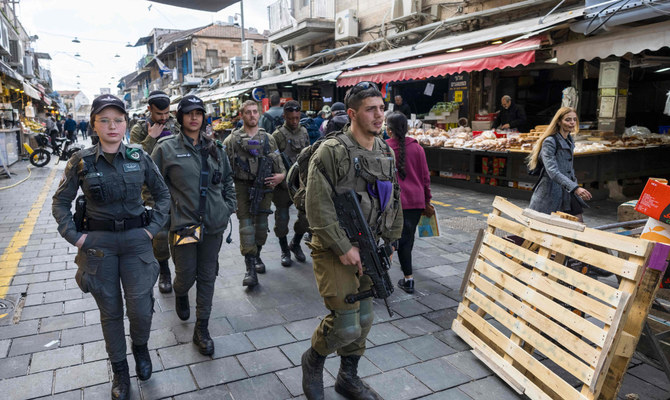RAMALLAH: Israel faced fresh accusations of launching an unprecedented security escalation against Palestinians as US Secretary of State Antony Blinken landed in Jerusalem on Monday to urge a deescalation in deadly violence.
Blinken called for “urgent steps” to calm spiraling violence in the Israeli-Palestinian conflict after high-level talks in Jerusalem.
Tensions have risen further since Prime Minister Benjamin Netanyahu returned to power in December, with religious nationalists in key Cabinet posts promising tougher stances and enraging Palestinians.
The Israeli army deployed checkpoints across West Bank cities and towns, with unprecedented settler attacks against Palestinian citizens preventing movement on main roads.
The Palestinian Ministry of Foreign Affairs called for placing violent settlers on terrorist lists.
Palestinian factions have called for broad participation at an open sit-in protest in Khan Al-Ahmar, which will start at 2 p.m. on Tuesday.
They stressed that Khan Al-Ahmar is a “red line in front of the policies of demolition, forced expulsion and ethnic cleansing” that Israel is promoting.
Palestinian activists also called for people to attend a central sit-in in Ramallah at 4 p.m on Tuesday in rejection of favorable US policy toward Israel.
The protest coincides with Blinken’s visit to the city.
Palestinian residents and activists called for the formation of protection committees to address settler attacks.
Birzeit University, one of the largest Palestinian universities, has returned to the virtual e-learning situation of the COVID-19 pandemic after thousands of students from the West Bank were unable to reach its campus over security fears.
Palestinians spend hours waiting at Israeli checkpoints deployed across the West Bank during the daytime, and become targets for settler violence at night.
Ahmad Al-Chami, a researcher in political science from Ramallah, told Arab News that Palestinian citizens were forced to protect themselves individually due to the inability of the Palestinian Authority to safeguard them from attacks in Area C as well the north and south of the West Bank.
“The Palestinian Authority has become unable to protect the Palestinian citizen who travels between Ramallah and Jenin or any other place in the West Bank in front of the attacks of the army and settlers, and he realizes that if he was also killed, the authority could not prosecute the killers,” Al-Chami told Arab News.
“Therefore, citizens are thinking of protecting themselves by their means, away from relying on the fragile authority,” he added.
The Palestinian Authority ended security cooperation with Israel on Jan. 27 following the murder of nine Palestinians in the Jenin refugee camp.
But many Palestinians view the measure as having failed to stop Israeli armed forces and settler attacks, Al-Chami said.
He added: “Did the Palestinian Authority’s decision to stop the security coordination save the lives of the Palestinians, bring them closer to reaching a solution or restore their rights?”
Hisham Al-Sharabati, a human rights activist from Hebron, agreed with the researcher, telling Arab News that Israel was failing to apply its laws against violent settlers, with most attacks against Palestinians occurring in the presence of the Israeli army.
Al-Sharabati said that some violent incidents were left unattended by Israeli police for long periods of time, despite authorities receiving requests for help by Palestinian victims.
“If a Palestinian tries to defend himself against settler attacks, the Israeli army forces will arrest him,” said Al-Sharabati.
He added that settler communities, in the wake of Netanyahu’s return to power, had become more aggressive and violent after being empowered by the new administration.
“The settlers’ feeling that they have government political support motivates and encourages them to commit more attacks,” Al-Sharabati said.
He added that the Palestinian Authority must safeguard Palestinians in Area C — which is under complete Israeli security control — and transform it from a functional apparatus into an authority.
Taysir Nasrallah, one of the field leaders of the Fatah movement in the Nablus region, told Arab News that it had become essential to activate and strengthen popular protection committees in Palestinian villages to discourage settler attacks in Area C.
Nasrallah expressed his fear that settler groups would commit massacres against Palestinian citizens, describing the behavior of the settler community as “very violent” and “reprehensible.”
He told Arab News: “Even during the Israeli military operation Defensive Shield in 2002, the Israeli army was the only group which attacked Palestinians. But now the army and the settlers are together, sharing roles among themselves in abusing Palestinian citizens and their property.”
Israel’s right-wing Finance Minister Bezalel Smotrich lives in a settlement in the West Bank, demonstrating the new government’s close ties to the settler community, the Fatah leader said.
January was the deadliest month for Palestinians killed in Israeli raids in the West Bank since 2015, the Palestinian Ministry of Health said on Monday — with an average of more than one person killed each day.
It added that 35 Palestinians had been killed by the Israeli military and settlers in the new year as of Jan. 30.
The figure includes eight Palestinian children and an older woman. Twenty of the deceased were from Jenin in the northern West Bank, a ministry statement said.
The death toll includes Omar Al-Saadi, 24, who was shot on Thursday during an Israeli raid on Jenin refugee camp that has been described as a “massacre.”
Al-Saadi, who died from his wounds on Sunday, was the 10th person killed as a result of the raid.
Another Palestinian was killed in clashes with the IDF in Al-Ram on Thursday.
Palestinian National Economy Minister Khaled Al-Osaily said on Monday that the annual losses of the Palestinian economy since 2020 amounted to $3.4 billion primarily due to Israeli restrictions on Area C.
Palestinians are barred from using land — 65 percent of the state’s territory — in the area, which contains vital economic resources.




















